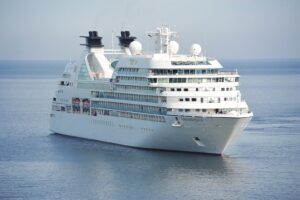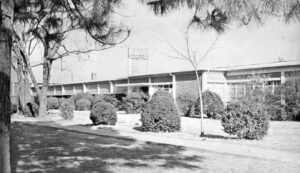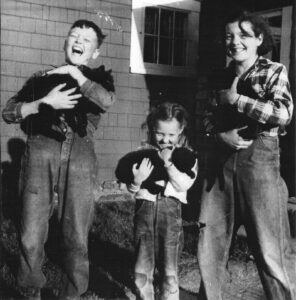Most people take for granted the convenience and “luxury” of shopping in the modern mega grocery stores of today like Kroger, Publix, Fresh Market, and Walmart. Things were not always this way.
A Brief History
Prior to 1946 most grocery stores in Aiken — the exception would be Hahn and Co. on Laurens Street where Aiken Drugs used to be — were small mom-and-pop operations that just sold basic staples. That all changed in 1946 with the opening of the Great Atlantic and Pacific Tea Co., better known as the A&P, on Park Avenue in what is now the Chesser Building. Augusta University Health and Aiken Dermatology reside in that building today. This was a larger store with a wider selection of groceries at lower prices. There was even a small selection of frozen foods — something revolutionary at the time. Soon other grocery stores followed. The A&P opened a second store in the Mitchell Shopping Center in 1958.
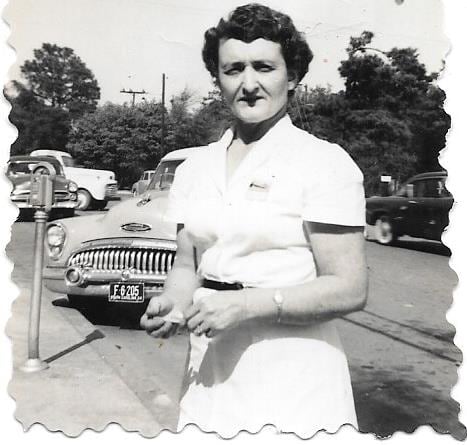
Lillian Chase was a checker at Eden Grocery.
Eden Grocery opened in February of 1948, on Laurens Street where the Screen Print Factory is today. Colonial Stores followed in July of 1948; it was located on Richland Avenue where City Billiards is today. In 1953, Colonial Stores opened a second location in the Mitchell Shopping Center.
After the Savannah River Plant began operation south of Aiken in 1953, many of its workers called Aiken home, and more stores were needed to feed the growing population. Two stores that were established in the early days of DuPont were Fulmer’s Red and White and Deaton’s Red and White. Fulmer’s had actually opened in 1948 as a small mom-and-pop store; when the Savannah River Plant opened they saw the opportunity for more business, so they enlarged their store at the corner of Colleton Avenue and Charleston Street. The store is no longer standing. Deaton’s was on Vaucluse Road in a building that still stands (but without a roof) beside Memorial Baptist Church.
Other grocery chains, including Big Star, Winn Dixie, Food Lion and BiLo, established stores here later on.
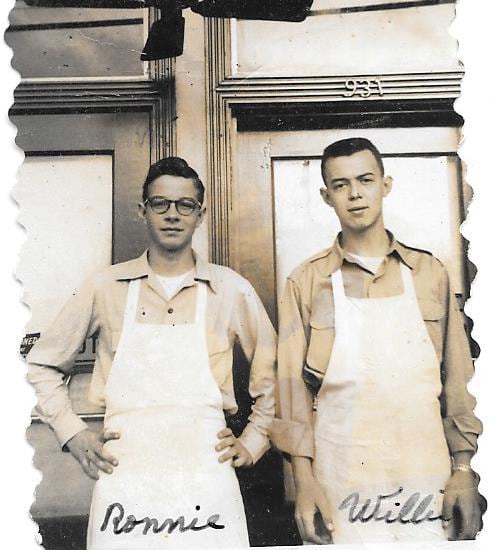
Ronnie and Willie were bagboys at Eden Grocery.
Working at Colonial Stores
Linda Carter Adams lived through the transition from mom-and-pop stores to the mega stores of today. Her grandparents, Dan and Eva Willis, owned a small store located on Lancaster Street in downtown Aiken.
Mrs. Adams remembers putting up stock in the store in her childhood. Deliveries usually came in on Thursdays. She especially liked stacking the canned milk. She also inventoried the loaves of bread the Colonial bread man, known as “Johnny the bread man,” brought into the store. Mrs. Adams was occasionally paid 25 cents.
Mrs. Adams’ first job was at McCrory’s Five and Dime, now home of the Aiken Antique Mall. There she earned 50 cents an hour.
In 1959, while a junior at Aiken High School, Mrs. Adams started earning 25 cents more an hour in her new job as checker at Colonial Stores on Richland Avenue, located where City Billiards is today. Mrs. Adams generally worked after school several days a week from 4 to 6 pm; she worked an eight-hour day on Saturday. The store closed at 7 pm each night, and was closed all day Sunday. She worked there for two years.
As a checker, Mrs. Adams’ primary duty was to check customers out after they were finished shopping. This was before prices were scanned from a barcode. Her cash register had three important keys: Meat, Produce, and Grocery. Mrs. Adams had to determine which of the three keys to press for each item before she entered the price.
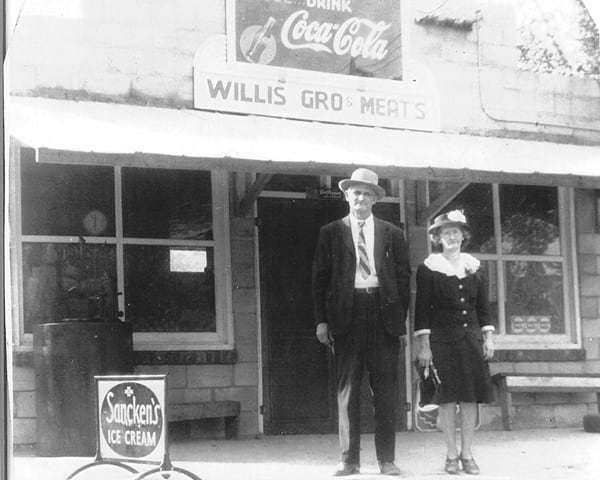
Dan and Eva Willis in front of their family-owned grocery store on Lancaster Street in downtown Aiken. This was the typical grocery store in Aiken prior to 1946.
Mrs. Adams remembers that most people paid in cash. Every now and then someone wrote a check, but there were no debit or credit cards. The smaller mom-and-pop stores kept a ledger for the customers who would pay
their bills every other week or at the end of the month. There was no ledger system in the new, larger stores.
When Mrs. Adams was not busy checking out customers, she sat in the office sorting the store coupons customers brought in to save a little money. And she checked items brought into the store by salesmen just as she had at her grandmother’s store years before.
In this particular store on Richland Avenue, there were four cash registers across the front, along with an office. When you walk into City Billiards today you can just imagine the checkout stations in front, with all the groceries in the back part of the building.
The store provided all checkers with a white dress that had Colonial Stores sewn into the pocket; all of the bagboys wore white aprons over their everyday clothes. Bagboys were stationed at each checkout station. They loaded the groceries into thick paper bags. Some customers asked to have their groceries boxed, and a pile of boxes was kept near the registers to facilitate those requests.
Back then not everyone had a vehicle, and if the customer lived within several blocks of the store, the bagboys would carry the groceries right to his or her house — that should have been a great opportunity for a nice tip.
When bagboys were not busy helping customers, they put up stock or cleaned the store.
When compared to today’s stores, one big difference was the size of the frozen food section. Aside from a few cartons of ice cream, back then the main item in the frozen food section was the Swanson TV Dinners that came in partitioned aluminum trays. If you are of a certain age, you will remember them. It took 25 minutes to prepare a Swanson TV Dinner in an oven — sorry, no microwaves.
According to Mrs. Adams, most people went to the larger grocery stores on Thursday, Friday, or Saturday. Saturdays were especially busy because that is when people from the country came into Aiken. This was perhaps the only time during the week — aside from church — that they were away from farm work, house duties, or child rearing.
In conclusion Mrs. Adams said, “I really liked my job at Colonial. I’m a people person.” She added that the 1950s was, “a laid-back time. I’m glad I grew up then.” When she goes to the grocery store today, she never uses the self-check stations. She says they take people’s jobs.
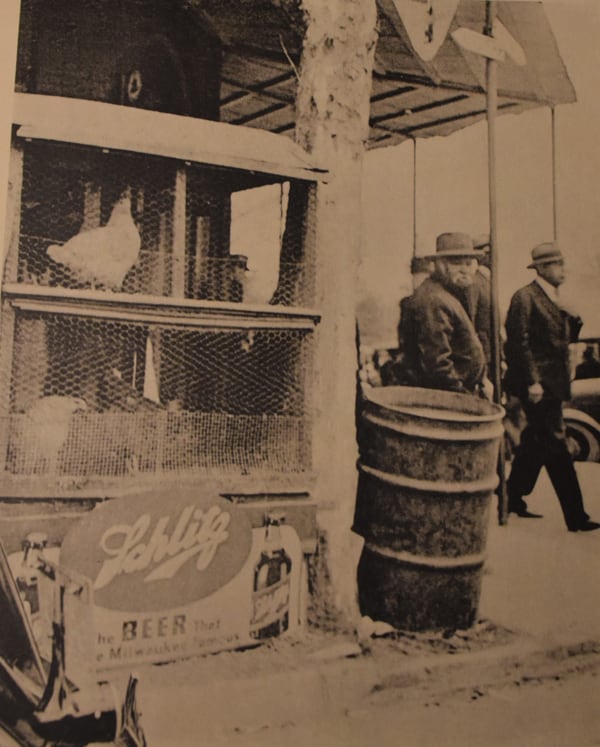
This chicken coop was outside an unidentified grocery store in downtown Aiken. The photo is from a photograph book published in 1942 entitled A Day in Aiken by Bert Clark Thayer.
Gospel Birds
The following story comes from an interview with Mr. Q. Jutson “Jut” Fulmer Jr. a few years ago, before his death. He grew up in the family business, Fulmer’s Red and White, and he and his brother later owned the Piggly Wiggly grocery stores in Aiken.
In the early 1940s, Gordon’s Grocery, located on Park Avenue a few doors west of the rebuilt Aiken Passenger Depot, sold live chickens from a little chicken coop located in front of the store. The transaction went as follows. The customer went inside the store and paid for the chicken, then went to the coop and grabbed one. He then tied its feet together and placed the bird in a bag. The bag had a hole in the bottom, and he placed the bird’s head through the hole. He was now ready for the walk home — many people didn’t have cars then — with an upside down, angry, squawking chicken. Getting the bird home was only half the battle. Once he got home, he had to kill it, clean it, and then cook it.
Fulmer Jr. recalled it was the early 1940s before you could purchase a chicken that was already cleaned. They came from the Jessie Jewel Company in Georgia in barrels packed with ice, and were shipped by railway express into the Aiken Freight Depot at Park Avenue and Williamsburg Street. At first those chickens could only be purchased on Fridays and Saturdays.
Because so many people back then fried chicken for their special Sunday dinners, Fulmer Jr. said the chickens were given the nickname “Gospel Birds.”
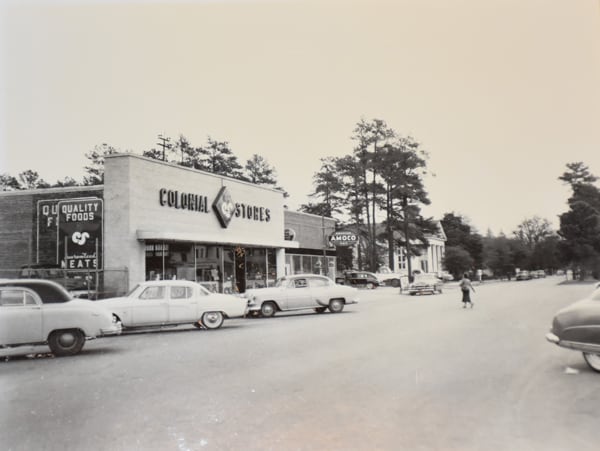
Colonial Stores was located on Richland Avenue where City Billiards is today. You can see the old St. John’s Church farther down Richland.


